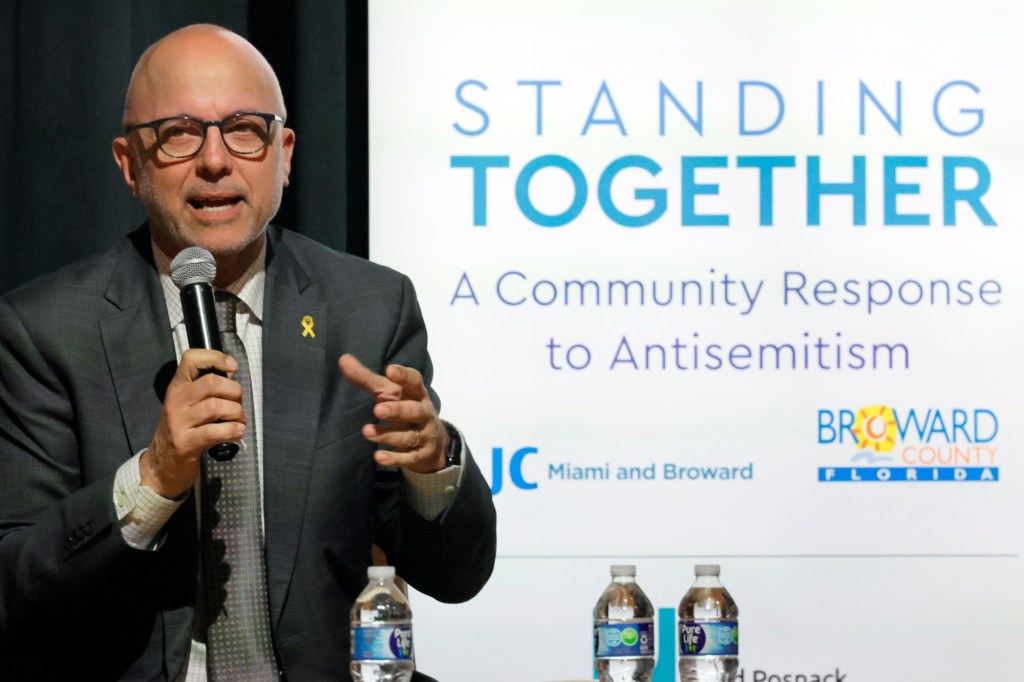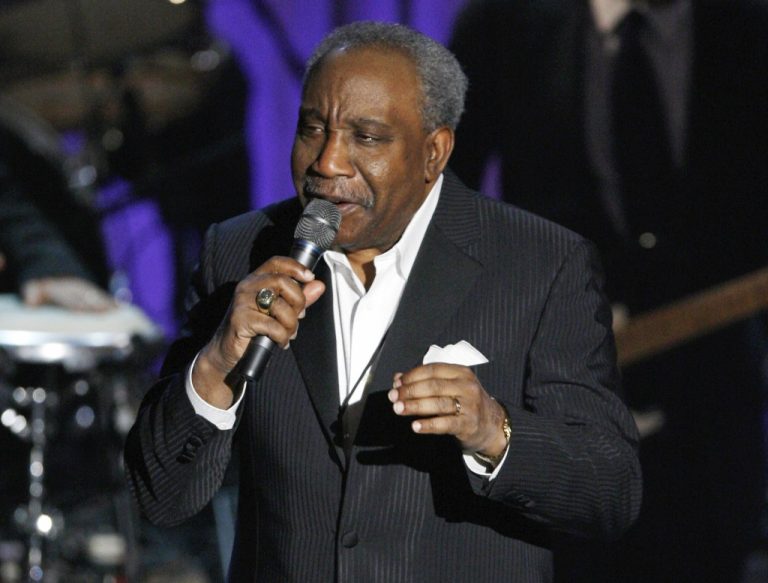
Antisemitism continues to surge in the United States, with the latest annual survey of American Jews reporting one-third have been targeted in person or online in the last 12 months — and more than half have changed their behavior, including taking steps so they’re not identified as Jewish.
And a huge share — almost three-quarters of those surveyed — said Jewish Americans feel less secure than they were a year ago. Three years earlier, less than one-third felt that way.
That has led some people to avoid wearing anything in public that might identify them as Jewish or avoiding publicly commenting on Jewish issues.
The sobering findings come from the American Jewish Committee, which commissions major surveys each year, one of Jewish Americans and one of the general population.
The implications are clear, said Ted Deutch, a longtime member of Congress from Broward and Palm Beach counties until he became CEO of the American Jewish Committee in 2022: “Jew hatred” has become “pervasive.”
“Antisemitism has reached a tipping point in America, threatening the freedoms of American Jews and casting an ominous shadow across our society,” Deutch said in a statement.
“This is an all-hands-on-deck moment for leaders across the U.S. We must act now to protect Jews — and America — from rising antisemitism. That one-third of American Jews have been the target of antisemitism in the past year should raise red flags for every American and our leaders,” he said.
In one of several reports detailing and analyzing the survey results, AJC said the findings are a “startling revelation of the depth and breadth of antisemitism in the United States.”
The organization’s State of Antisemitism in America, released the second week in February, is based on surveys conducted in October and November.
Widespread
Nine out of 10 Jewish adults said antisemitism in the U.S. has increased during the last five years.
Six in 10 Jewish Americans said it has increased a lot. It’s the first time since the first AJC survey in 2019 that a majority expressed that view. In 2019, four out of 10 said antisemitism had increased a lot over the previous five years.
The experiences in the community are different from what’s perceived by people who aren’t Jewish.
A smaller share of the general public, six in 10 people, said antisemitism has increased over five years, with three in 10 saying it has increased a lot.
The most recent Audit of Antisemitic Incidents compiled by another organization, the Anti-Defamation League, found an enormous increase.
ADL reported 8,873 antisemitic incidents in the United States in 2023 — almost two-and-a-half times the 2022 total and a more than ninefold increase from 2014.
In the AJC survey, a third of American Jewish adults said they had been the personal targets of antisemitism, in person or online, in the 12 months leading up to the survey.
- Almost a quarter said they’d been the target of an in-person antisemitic remark.
- 17% said they’d been the target of an antisemitic remark, online post or social media comment.
- 6% said they’d been the victim of antisemitic vandalism or messaging such as flyers or pamphlets left on their property.
- 3% said they’d been the target of at least one antisemitic attack during which the attacker physically touched them.
And the survey found, the vast majority of people, eight of 10, don’t report what they’ve experienced, with most saying they didn’t think anything would be done.
No place is immune, even South Florida, home to a large Jewish community and supportive public officials, said Brian Siegal, AJC’s regional director for Broward and Miami-Dade counties.
“I will say in South Florida, because we’ve had elected leaders who have spoken up in solidarity with Israel, in solidarity with the Jewish community, I think there is more of a sense of security. We don’t have the statistics yet broken out in that way,” Siegel said.
Regional breakdowns, not fully analyzed or widely released by AJC, shows that responses from people in the South — a region including Florida — were almost identical to the national results, typically within a percentage point or two of the national responses to the same question.
Among Jewish adults, 93% see antisemitism as a problem in the U.S., with 54% terming it very serious and 39% saying it’s somewhat of a problem.
Among all U.S. adults, 72% said antisemitism is a problem, with 31% terming it very serious and 40% saying it’s somewhat of a problem.

Changing behavior
Siegal said one of the findings that jumped out was “the fact that a majority of American Jews, 56 percent, report changing their behavior out of fear of antisemitism. Basically whether they want to wear a kippah or not, go to an event at a synagogue, or just really (feel) threatened in a way that I don’t think we’ve really seen before.”
That represents a dramatic increase. In 2022, 38% said they’d changed their behavior, and in 2023, almost half said they’d taken that step.
Among the steps people have taken:
- Two of five said they have avoided publicly wearing or displaying things that might identify them as Jewish, up from 26% in 2023.
- 37% said they have avoided posting content online that would identify them as Jewish or reveal their views on Jewish issues, compared with 30% in 2023.
- Nearly a third said they have avoided certain places, events or situations, up from 26% in 2023.
What is antisemitism?
A definition of antisemitism from the International Holocaust Remembrance Alliance has been broadly adopted, including by the U.S. State Department and many nongovernmental organizations.
“Antisemitism is a certain perception of Jews, which may be expressed as hatred toward Jews. Rhetorical and physical manifestations of antisemitism are directed toward Jewish or non-Jewish individuals and/or their property, toward Jewish community institutions and religious facilities,” the definition states.
There are some broad areas of agreement, and of disagreement, between Jewish and non-Jewish Americans about whether certain views and statements are antisemitic.
The statement that “Israel has no right to exist” is seen as antisemitic by 85% of Jews and 85% of the general public.
The claim that “Jews control the media” is seen as antisemitic by 92% of Jewish Americans and 70% of the general public.
But there are divergent views about the declaration, “From the River to the Sea, Palestine will be Free,” with almost two-thirds of Jewish adults and 28% of the general population seeing it as antisemitic.
U.S. Rep. Debbie Wasserman Schultz, the first Jewish woman from Florida elected to Congress, has said the “River to the Sea” phrase “means eradicating Israel and Jews.” U.S. Rep. Rashida Tlaib, D-Mich., who has used the phrase, once described it as “an aspirational call for freedom, human rights, and peaceful coexistence, not death, destruction, or hate.”
Since Oct. 7
More than three-quarters of Jewish Americans said they feel less safe as Jewish people in the U.S. since the Oct. 7, 2023, Hamas terrorist attacks that resulted in the ongoing war in the region.
Since then, nine of 10 American Jews say antisemitism has increased since the Hamas attacks and almost 62% of the general population said antisemitism has increased.
AJC termed one finding from the survey of U.S. adults — 20% saying Hamas is a militant resistance group that works primarily in the best interest of the Palestinian people — “shocking.”
The vast majority saw Hamas, which launched terrorist attacks on Israel on Oct. 7, 2023, leading to the war in the region as a “terrorist organization.”
Deutch, appearing on CNN, said the 20% figure was alarming. “The fact that one in five people think that the terrorist group Hamas — that exists for the sole purpose of killing Jews and and trying to destroy Israel, that was responsible for the slaughter of over 1,200 Jews on Oct. 7, and still is holding over 75 hostages in Gaza — that that’s something other than a terrorist group, that’s very concerning,” he said.
Sources of concern
Majorities of Jewish Americans see antisemitic threats from the “extreme political right” and from the “extreme political left.”
Other areas of concern are extremism in the name of Islam and Christian nationalism.
Notably, the concern about all four was about the same. For each category, a third said it was a very serious threat. And it was seen as a threat — very, moderately or slightly — by 76% to 79%, a statistically insignificant difference.
“We have to understand that these threats, they come from the far right. They come from the far left. They come from social media. They come from misinformation. There is not a one size fits all,” Siegel said.
Political parties
Neither political party gets good marks for its response to antisemitism.
- 54% of Jewish adults disapprove of the way the Republican Party is responding to antisemitism in the U.S.; 45% approve.
- 59% of Jewish adults disapprove of the way the Democratic Party is responding to antisemitism in the U.S.; 39% approve.
Most Jews disapprove of the way antisemitism is being handled by the federal government (58%), Congress (56%), and “your state and local government” (54%).
Going forward
Holly Huffnagle, AJC’s director for combating antisemitism in the U.S., said in a statement that it’s positive that “more people are aware of antisemitism as a societal problem” and some people are speaking out on it.
Still, she added, “we need everyone to recognize they can no longer stand on the sidelines. They must be part of the solution.”
Siegel said a big plus in South Florida “is that there is a lot of Jewish pride.”
“We have a lot of allies and we have … a lot of support from elected officials and community leaders, but we also know that security is paramount and we can’t sort of let our guard down. We know that the Jewish community has to be vigilant,” he said.
What is AJC?
The American Jewish Committee advocates around the world in support of Israel, fighting antisemitism, and promoting democratic values.
Deutch was a Democratic member of Congress, but since joining AJC he’s stepped away from partisan politics and became CEO in October 2022. The organization is nonpartisan and does not endorse candidates.
AJC’s first poll of Jewish adults was in 2019. The following year it began a companion survey of the U.S. adult population.
The latest surveys were conducted from early October through late November by the survey firm SSRS.
The survey of 1,732 Jewish American adults was conducted online and through phone interviews. The survey of 2,056 adults in the general population was conducted through an SSRS online panel.
The results have a margin of error of plus or minus 3 percentage points.
Anthony Man can be reached at aman@sunsentinel.com and can be found @browardpolitics on Bluesky, Threads, Facebook and Mastodon.
Originally Published:







